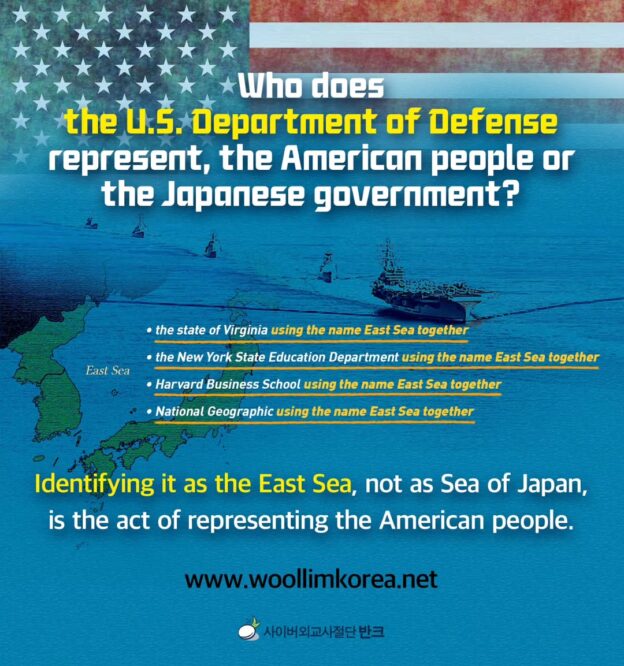
The United States Department of Defense caused significant controversy this past February by referring to the East Sea as the “Sea of Japan” during a joint military training exercise with South Korea and Japan in the East Sea. The Department’s use of the term “Sea of Japan” instead of “East Sea” has led to a serious diplomatic issue.
In response to criticism, the United States asserted that “Sea of Japan” is the correct official designation and stated that this term will continue to be used in all future references. The U.S. government has made it clear that this policy applies not only to the Department of Defense but across all government agencies, prompting an escalation in concerns regarding its potential impact on South Korea-U.S. relations.
Allowing the Department of Defense to persist in using “Sea of Japan” could severely affect the goodwill and friendship between the people of South Korea and the United States. More importantly, this error could create confusion in the international community, particularly since the global consensus calls for the dual naming of the sea as “East Sea/Sea of Japan.”
Thanks to the efforts of organizations like VANK and the Korean community, there has been significant progress in promoting the use of “East Sea” in various educational institutions across the United States. The inclusion of “East Sea” in U.S. textbooks has increased from 3% to 40% worldwide. Notably, in 2014, the state of Virginia passed legislation mandating the dual naming of the East Sea/Sea of Japan, and in 2019, the New York State Education Department also adopted this practice, ensuring that all textbooks reflect the dual naming.
Furthermore, VANK’s efforts led to the inclusion of “East Sea” in the curriculum at prestigious institutions such as Harvard Business School and National Geographic’s educational materials.
In light of these developments, if the U.S. Department of Defense continues to advocate for the exclusive use of “Sea of Japan,” it will alienate U.S. citizens who support dual naming and harm the relationship between South Korea and the United States. Such a decision would also send a troubling message from the U.S., a global leader, regarding its adherence to international principles.
The United Nations Conference on the Standardization of Geographical Names (UNCSGN) declared in 1977 that when multiple countries share a geographical feature, and it is difficult to agree on a single name, the names used by each country should be listed together. This principle, adopted by the international community, underscores the importance of respecting the naming preferences of all parties involved.
To address this issue, VANK is launching a global campaign to correct the U.S. Department of Defense’s use of “Sea of Japan.” As part of this initiative, VANK has created a poster in both Korean and English with the title, “Does the U.S. Department of Defense Represent the American People or the Japanese Government?” The poster highlights examples of where the “East Sea” is used, including in Virginia, New York, Harvard Business School, and National Geographic, emphasizing that using “East Sea” better reflects the interests of U.S. citizens.
In addition to distributing the poster, VANK has sent a formal letter of protest to the U.S. Department of Defense and launched a petition on a global platform (www.bridgeasia.net) to raise awareness about the U.S. Department of Defense’s failure to adhere to international norms. VANK is also calling on the South Korean government to take a more active diplomatic stance through platforms like Woollim Korea (www.woollimkorea.net), urging agencies such as the Ministry of National Defense and the Ministry of Oceans and Fisheries to address the issue.
Meanwhile, the Japanese government is continuing to promote the “Sea of Japan” designation through the Japanese Ministry of Foreign Affairs and YouTube. In response, VANK has established a global East Sea advocacy site (eastsea.prkorea.com) and is organizing campaigns to raise awareness about the injustice of the “Sea of Japan” label and promote the proper use of “East Sea.”